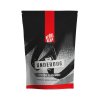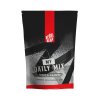Ethiopia Mensur Abahika
| Category: | Coffee |
|---|---|
| EAN: | Choose variant |
| Farmer: | Mensur Abahika |
| Region: | Kota Kebele, Jimma |
| Variety: | JARC 74110 |
| Processing: | Decaf - decaffeinated cofee ( using Sugarcane method) |
| Altitude: | 1 750 - 2000 masl |
| Importer: | Osito |
| Roast type: | Omni roast |
| Roast date: | In the last 14 days |
Sweet & Velvety
Our decaffeinated coffee is once again uncompromising! Amazingly sweet, smooth, and very clean in taste. It stands out both as an espresso and as a filter coffee, where the sweetness of nougat with the pleasant fruitiness of dried fruit and dates comes through beautifully. All this is complemented by a pleasant chocolate flavor and full body. Espresso brings out a slightly higher acidity, an intense aroma of sweet spices and a taste of hazelnut butter and dried fruit.
This time, our decaffeinated coffee comes from the Jimma region in southwestern Ethiopia and is the product of a single farmer, Mensur Abahika. It is a 74110 variety processed using the washed method. Until recently, the Jimma region was known for coffees processed mainly using the natural method, which did not stand out for their quality. However, this has been changing over the last few harvests, with farmers taking greater risks, investing in washed processing, and the quality of local lots improving rapidly!
This decaffeinated coffee was first processed using the classic washed method and only then decaffeinated. The decaffeination process was carried out using the sugar cane method, in which ethyl acetate is used as the active ingredient.
At Rebelbean, we have long known that decaf is simply great! We love drinking coffee, and we drink a lot of it – but the effects of too much caffeine are not very pleasant. Decaf is a great solution! Especially since the coffee still retains most of its original flavor. Technology is advancing every year. You are probably interested in how the entire decaffeination process works.
The “sugar cane” method:
- The beans are first cleaned with hot steam and then hydrated with hot water to swell and soften.
- In the second phase, the hydrolysis of caffeine takes place thanks to chlorogenic acid, which is a natural part of coffee beans. Extractors are obtained naturally by fermenting sugar cane – hence the name of the process. With the help of ethyl acetate, the amount of caffeine in the beans is reduced to the desired level in several identical repeated steeping steps.
- Subsequently, the beans are again cleaned from the rest of the ethyl acetate with saturated steam and are mechanically dried to the required normal level of 10-12% moisture.
Roasted coffee beans, 100% specialty coffee Arabica, roasted and packed in the Czech Republic.
Be the first who will post an article to this item!












